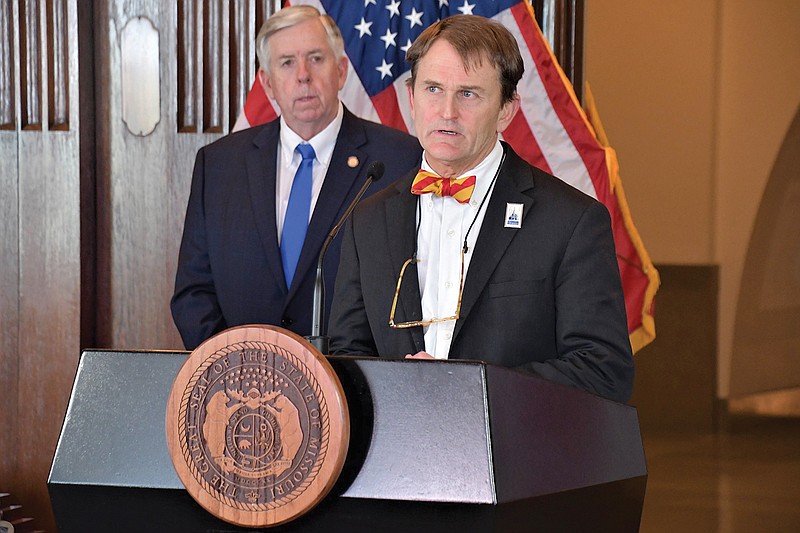[<a href="https://www.newstribune.com/news/health/" style="color:#33AEFF">access the News Tribune Health section</a>]
Missouri's hospitals are adapting to the challenges posed by the COVID-19 pandemic, but those same hospitals are also losing $32 million a day, and the state is getting involved in monitoring their liquidity challenges, the leader of the Missouri Hospital Association said Monday.
At Gov. Mike Parson's Monday briefing on the pandemic, Herb Kuhn, president and chief executive officer of the Missouri Hospital Association, said hospitals stopped doing elective procedures in order to protect staff and the public, and to preserve critical supplies of personal protective equipment, such as masks and gloves.
However, "that move has taken a toll," Kuhn said.
"We currently estimate that Missouri hospital revenues are off by more than 50 percent," he said, adding that equals $32 million a day, and nearly $1 billion per month, at a time when hospitals are trying to maintain 24-hour operations and gearing up to face the peak of the pandemic.
The issue has been especially problematic for rural hospitals, Kuhn said.
Financial assistance has arrived, but it won't carry the system for very much time.
The federal Coronavirus Aid, Relief and Economic Security Act, or CARES Act, included a $100 billion fund to aid health care providers, and hospitals received about half of the first $30 billion payment that was released Friday, Kuhn said.
He said Missouri received approximately $618 million of that to support 5,252 health care workers or organizations. However, "with our current decline in revenues, it only sustains us for about 10 days," Kuhn said.
He announced the state has joined MHA in a financial task force to monitor the liquidity challenges of hospitals "and to look at every federal and state program we can support and use to provide sustainability."
Further details were not immediately provided by Parson at the briefing or a later news release from his office.
Kuhn said Missouri's hospitals have also converted or added 1,000 intensive care beds across the state, and are benefiting from a federal preparedness program, and mutual aid agreements established in 2007 that also served the state after the 2011 Joplin tornado.
Sandra Karsten, director of the Missouri Department of Public Safety, said Monday the state's first alternate care site - where patients can be sent if hospitals reach and exceed capacity - would be ready today to, if necessary, begin accepting patients with mild or no symptoms.
The site is at a Quality Inn in Florissant, Karsten said.
She also noted the state is having to recall 48,000 KN-95 masks that went out to law enforcement and fire services April 2 and April 8.
"Testing over the weekend by the Missouri Department of Health and Senior Services showed that some of these masks did not meet standards," Karsten said.
"We'd ask our local response partners to immediately pull those masks out of circulation and to make sure they are not used. SEMA (the State Emergency Management Agency) will be collecting those masks to ensure they are not used," she added.
Cole County Sheriff John Wheeler told the News Tribune his department had received 60 of the recalled masks, but none had been issued among his department's personnel.
Lincoln University Police Department Chief Gary Hill said his department had received 25 of the recalled masks, and five had been given to campus security officers, who are non-sworn duty officers who are providing security where the few students who remain on campus are staying.
Hill added the masks were never used.
Officials with the Jefferson City Police Department said the department had gotten some of the masks, but it was not immediately known how many. None of the recalled masks had been used and JCPD has been using masks received from Cole County Emergency Medical Service.
Matt Lindewirth, chief of Cole County EMS, told the News Tribune that Cole County EMS had not received any of the recalled masks.
Jason Turner, public information officer with the Jefferson City Fire Department, said JCFD had received a "small amount" of the recalled masks - Turner was not immediately sure how many - but that none had been used.
Osage County Sheriff Mike Bonham said five masks that were being recalled had been issued in his department, but Bonham was not sure if any personnel had used them.
The News Tribune did not immediately receive a response from Callaway or Moniteau counties' sheriff's departments.
Karsten later said at the briefing that because of the recall, "we are establishing a working group" comprised of "experts on PPE from the DHSS, as well as DPS and SEMA" to more closely look at PPE procurement.
"We will invite the attorney general's office to assist us in this review, and we will also include our procurement specialist from the Office of Administration," she added.
Karsten said PPE vendors have been receiving specifications of what the state is looking for in its PPE orders, references are checked, and if samples of the product to be produced are not available, the state's been asking for photographs.
Another bit of news from Monday's briefing on the medical front is that people who have recovered from COVID-19 are being encouraged to donate blood plasma.
DHSS Director Dr. Randall Williams said more information on the state's "convalescent plasma program" is available on the department's website.
More information is available at health.mo.gov/news/newsitem/uuid/b824125a-9d7d-47b5-b610-96118c3920b1/recovered-covid-19-patients-encouraged-to-donate-plasma-to-treat-current-patients.
Donors must be older than 18, not pregnant, and have been recovered from COVID-19 for 14 days, Williams said.
Plasma with COVID-19 antibodies in it can help the severely ill, he said.

